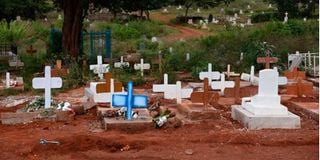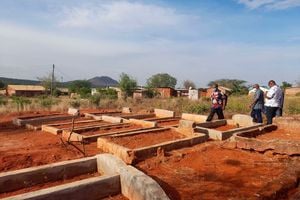
Langata cemetery in Nairobi.
At the Nakuru North Cemetery in the heart of Nakuru City, a gravedigger is keen not to disturb the remains of those buried almost a decade ago.
He is preparing a grave to be re-used. But the cemetery, just like the one in Nakuru South, is brimming with graves, declared full over a decade ago.
But the burial crisis isn't unique to Nakuru: it's a predicament shared by Kenya's major cities – Nairobi, Mombasa and Kisumu.
As the population in Kenyan cities continues to rise, it puts more strain on the availability of burial space, with the existing graveyards already filled up.
If nothing happens, residents of cities will soon have no place to bury their loved ones.
Culture versus reality
In Nakuru, amid inadequate burial space, desperate measures are taken to cope with the shortage of burial space, including recycling graves and digging new ones along footpaths within the cemeteries' confines.
However, for many residents, these measures violate cultural and traditional beliefs, sparking concerns about the peace of the departed.
"Grave diggers are abusing the rights of the dead who are no longer resting in peace," said Mary Kamau, a resident of Nakuru's Milimani, where the Nakuru North cemetery is located.
A spot check by Nation.Africa shows that 10-20 graves are re-opened weekly to allow for second burials in Nakuru North and South cemeteries.
Residents lament the scarcity of burial plots, fearing a future where there's no space left for their loved ones.
“Where will we bury our loved ones? This is a big dilemma that the county government must swiftly address. The situation is dire because, in the next few years, we will have no space to bury our loved ones," said a resident, John Kimani.
Resistance and bad omen
Attempts by authorities to acquire new cemetery land are frustrated by community resistance and taboos surrounding burial grounds.
Despite allocated funds, securing suitable land has proven elusive, leaving cities grappling with an impending burial crisis.
“Many communities don’t want a cemetery next to their residential places but as a county, we are determined to get one and soon we shall get alternative burial space,” revealed a senior county official.
"We are on course and we are fast-tracking the procurement of the cemetery land. We want a new cemetery because the ones we have are full,” said the official.
Interestingly, since the advent of devolution in 2013, it has been challenging for the county government to get land for new public cemeteries.
In the 2014/2015 financial year, Sh84 million was budgeted for the purchase of a 20-acre alternative parcel of land for a public cemetery.
Another Sh30 million was allocated in the 2015/2016 budget, Sh40 million in 2016/2017 and a similar amount in 2017/2018.
In the 2019/2020 financial year, another Sh20 million was set aside to purchase land for a cemetery.
A majority of residents have been reluctant to sell land to accommodate a cemetery for fear of being haunted by spirits.
Residents associate cemeteries with bad omen.
Not six feet under
In Nairobi, the Lang'ata cemetery declared full over two decades ago, continues to receive bodies daily, with families facing limited options for burial. Efforts to find alternative sites have been marred by bureaucratic hurdles.
Sometimes, it is not even possible to bury them in the requisite six feet under, but families have limited options.
Despite Nairobi having eight other cemeteries, mainly communal, the expansive Lang'ata cemetery is still a favourite to many.
The other smaller cemeteries in Nairobi are Forest Road, Pangani, Mutuini, Uthiru, Southlands, Kariokor Christian and Ruai.
Authorities still insist that the cemetery still has a capacity of about 2,000 graves.
Recently, Nairobi Governor Johnson Sakaja revealed that the county was keen to acquire a new burial ground.
"I know we need an alternative burial site, but l am negotiating with the national government to allow us to take part of forest land for a cemetery," stated Sakaja.
Langata Member of Parliament Felix Odiwuor alias Jalango has tabled a motion in the National Assembly on the status of Lang'ata cemetery.
In the motion, tabled last year, Jalang’o has exposed the ongoing public outcry over the neglect of the graveyard that was declared full in 1998, but has continued to accommodate more bodies due to a lack of alternative sites.
He said wild animals from the nearby Nairobi National Park were uncovering and mauling bodies of the dead because of failure by the county and Ministry of Health to seek alternative sites.
“This situation has led to overcrowding and double-allocation of burial sites with bodies being buried in shallow graves leading to frequent uncovering by wild animals from the nearby National Park,” the MP told the floor of the House.
Jalang’o asked the national government, through the Ministry of Health, to urgently conduct a public health risk assessment posed by the continued use of the cemetery and to institute mitigatory measures.
He wants the ministry and the county to identify suitable alternative land for use as a cemetery.
Embakasi North MP James Gakuya termed the state of the cemetery as deplorable but opposed its closure before an alternative site is secured.
“Those who call Nairobi home have nowhere to bury their departed ones. What I, therefore, ask is that the national government and the County of Nairobi hastily find an alternative cemetery site,” Gakuya said.
The Lang'ata cemetery is divided between a permanent and temporary section. Space at the permanent graves for adults costs Sh30,500, Sh15,500 for infants and Sh22,500 for children between 1 and 15 years.
For non-citizens to have permanent graves at Lang'ata, the families pay Sh50,000 for adults, Sh35,000 for children and Sh27,500 for infants.
Those from outside Nairobi pay Sh40,000.
With families who prefer temporary graves for their loved ones, City Hall has maintained its charges at Sh7,000 for adults, Sh4,000 for children and Sh2,000 for infants.
Several attempts by the City Hall to seek alternative sites have failed, with some efforts turning into massive scandals.
Lang'ata Cemetery was opened in 1958.
The situation is similar in Kisumu and Mombasa cities, where the main cemeteries are filled up.
The main Mamboleo cemetery in Kisumu is experiencing many challenges, including access, congestion and encroachment.
Cemation push
The crisis has pushed health authorities and leaders in the cities to begin thinking creatively about how best to dispose of the dead.
In some cities like Nairobi, health chiefs have been encouraging residents to embrace cremation as an alternative amid the crippling shortage of cemeteries to bury the dead.
A governance expert, David Kimani, says cremation is the way to go amid the shortage of burial space.
“Cremation should be embraced as the respective county governments continue looking for land to put up cemeteries. This can be a good alternative to ease pressure on public cemeteries,” said Mr Kimani.
According to Kimani, cremation was slowly getting accepted in the country.
However, Nation.Africa established that the majority of residents do not prefer cremation.
“Our culture does not allow a person to be cremated. Instead we lay our people to rest in graves. Afterall...Why would I cremate a loved one? It is like sending someone to hell," said Jeremiah Ombati, a resident of Nakuru.
Several other residents interviewed dismiss cremation, saying it is against their cultural practices and beliefs. Those opposed believe a bodily form is required to reach the afterlife and not ashes.
In Nakuru, the only crematorium belongs to the Hindus, situated next to the Nakuru South cemetery.









